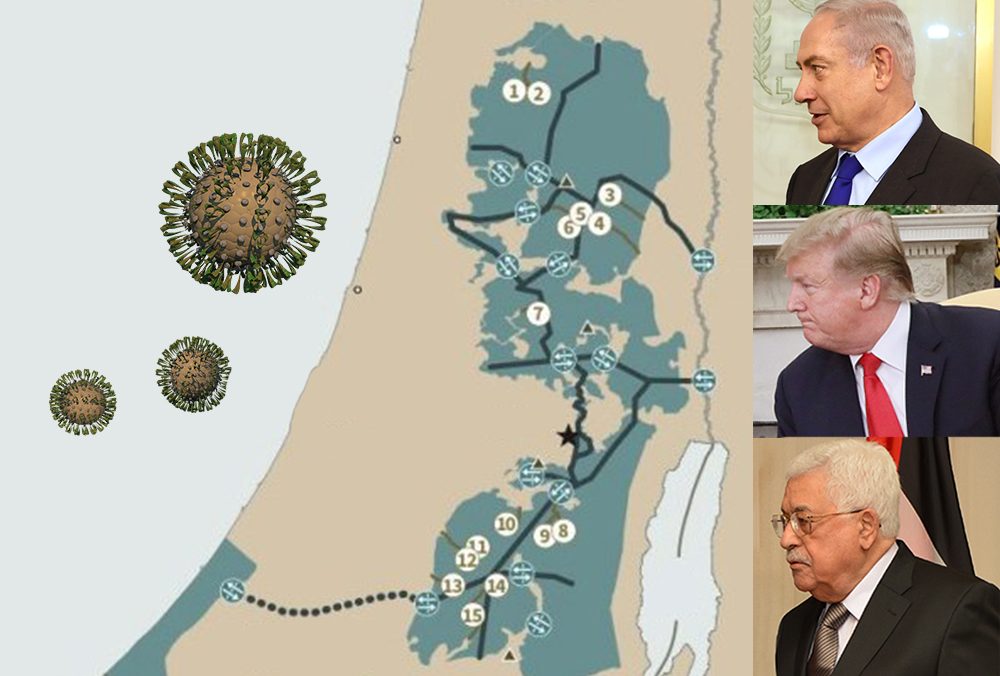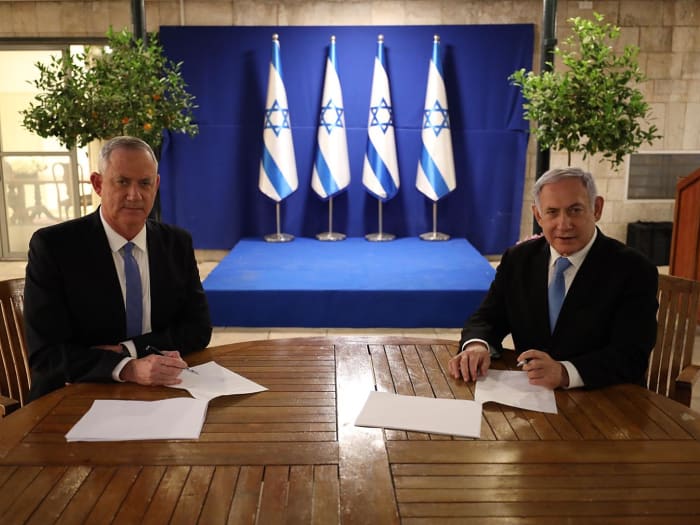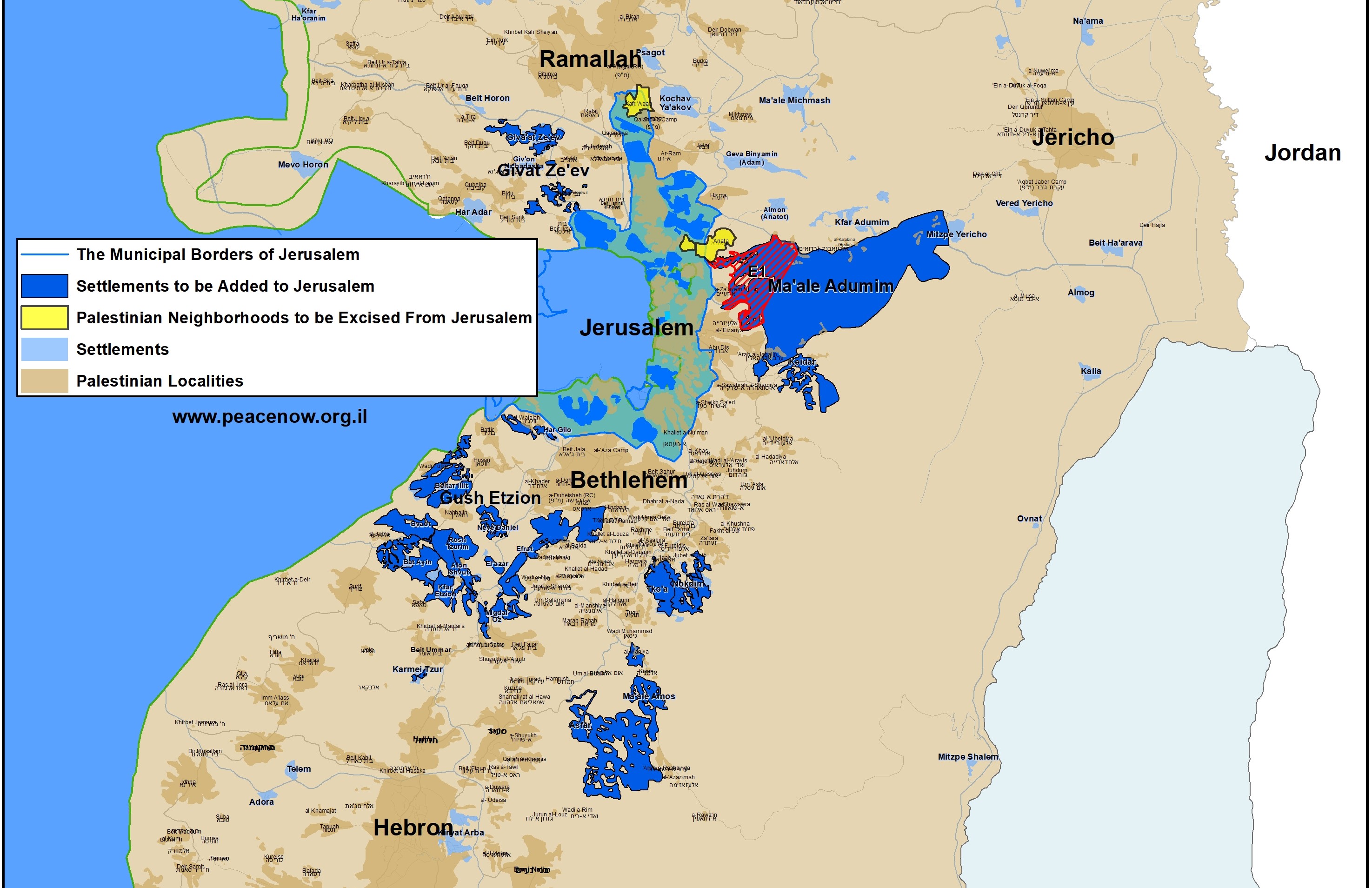Publications
Special Publication, May 3, 2020

This article focuses on the idea, if not the intention, to maximize what is perceived as a window of opportunity to advance the application of Israeli sovereignty to the territories in the West Bank. For an interest group that aspires to this goal, and especially for Prime Minister Benjamin Netanyahu, there is a sense that under the current circumstances, Israel has an unprecedented opportunity that it will not have again in the near future to apply Israeli sovereignty to settlement areas. This window of opportunity has emerged in part because Donald Trump, as the President of the United States, is eager to leave his mark on history, and world leaders are currently fully preoccupied with the coronavirus crisis. Applying sovereignty unilaterally within the West Bank, without a genuine attempt to reach an agreement with the Palestinian Authority, even during the era of the coronavirus crisis, will not improve the State of Israel’s strategic situation and its ability to cope with current and future strategic challenges, be they corona-related or otherwise. On the contrary, it will undermine its founding vision as a Jewish, democratic, secure, and moral state that seeks peace with its neighbors. It is therefore recommended that the new government in Israel call on the Palestinian leadership to return to the negotiating table, with the Trump plan included in the terms of reference for negotiations. If the Palestinians continue to refuse to discuss the plan, then the government will be able to receive public support in Israel for steps toward unilateral separation from the Palestinians, including gradual annexation conducted in a way that ensures that Israel’s political, security, economic and social interests are met.
The Circumstances of the Coronavirus Crisis
The public lexicon has been enhanced lately by a new phrase: life in the presence of the coronavirus. The phrase describes every sense of the reality of our lives in the coming months in 2020, and perhaps beyond. This reality will continue until a cure or a vaccine for the virus is found. The entire world is currently occupied with the spread of the virus and its severe negative influence in three areas – health, the economy, and society. On April 9, 2020 the UN Security Council – the entity responsible for world peace and security – held a discussion on the March 23, 2020 proposal by Secretary-General António Guterres to institute a worldwide ceasefire that would allow all efforts to focus on the fight against the virus. The idea to channel and coordinate efforts on the global war against the virus, which has thus far claimed the lives of about a quarter of a million people around the world, and suspend conflicts until "the day after corona," is most welcome. At the same time, it is surprising – and disturbing – that a threat to the entire world, which will likely inflict damage on economies across the globe, aggravate areas of distress, and potentially cause a nutritional catastrophe across large areas of the globe, would only generate limited collaboration at an international level. The lack of global leadership in this situation is quite salient and profoundly evident.
In this atmosphere of global crisis, Israel decided on an emergency and national unity government. The primary aim during this national emergency is to unite forces in the war against the pandemic. When the new government sits down to work and drafts a budget, the principal objective will presumably be to revitalize Israel's society and economy, strengthen the healthcare system, and perhaps also the welfare system, both of which have been neglected for many years. This will come at the expense of investing in defense, although Israel's defense needs will not disappear.

Israel's political and security objectives during the coronavirus era include: (a) encouraging the speedy recovery of national health, economy, and society, and return of the state, economy, and society to effective functioning; (b) preventing the need to pay what for Israel are intolerable prices as a result of COVID-19, such as high mortality, the collapse of the health system, or the collapse of the economy; (c) achieving government stability, upholding democracy and governance, and maintaining the formula that connects and integrates the different groups that comprise the Israeli public; (d) preparing for an extended period in the presence of the coronavirus, including the possibility of an additional outbreak; (e) achieving security stability in various conflict theaters and preventing exploitation of the situation and attempts by adversaries and rivals to undermine Israel's security situation; (f) making the most of the opportunities that the crisis presents to achieve Israel's political, military, and economic objectives. All of these challenges facing the new Israeli government apply to all stages of managing the COVID-19 crisis: containment, renewal of economic and social activity, life in the presence of the virus, and the day after the coronavirus (when a treatment or a vaccine is found). Meeting these challenges will require a holistic approach.
Applying Israeli Sovereignty, under COVID-19 Auspices: An Ostensible Opportunity
As the world's attention is focused on the crisis, there exists an ostensible opportunity to apply Israeli sovereignty to the settlements in the West Bank.
The discussion below focuses on the idea, if not the intention, to maximize what is perceived as a window of opportunity to advance the application of Israeli sovereignty to the territories in the West Bank under the auspices of the coronavirus. It seeks to analyze the significance of such a move, and examine the advantages and risks inherent in such a move now, and in the day after the crisis.
The expression "timing is everything" might seem to apply to the annexation of territories in the West Bank under the auspices of the coronavirus crisis. From an international perspective, world leaders are preoccupied with their domestic management of the virus; the US is busy with internal power struggles ahead of the upcoming November presidential election, which may result in President Donald Trump not winning a second term. President Trump's desire to leave his mark on history and his aspiration to satisfy his primary support base of conservative evangelical Christians align with the idea of annexing territories of the Holy Land to the State of Israel. In the Israeli domestic arena, the current moment is also seen as a golden opportunity that did not exist in the past to apply sovereignty and may not return in the near future, particularly if a Democrat is elected president in the United States. Prime Minister Benjamin Netanyahu, the longest-serving Prime Minister in Israeli history, shares this sense of opportunity, and wishes application of at least partial sovereignty to be part of his strategic national legacy.
Indeed, the coalition agreement between the Likud bloc and the Blue and White faction led by Benny Gantz states: "As regards the announcement by President Trump [i.e., “the deal of the century”], the Prime Minister [Benjamin Netanyahu] and the alternate Prime Minister [Benny Gantz] will act with the full consent of the United States, including regarding maps, and in international dialogue on the matter, all while striving to safeguard Israel's security and strategic interests, including the need to maintain regional stability, maintain peace agreements, and strive for future peace agreements…notwithstanding the aforesaid, and after discussions and consultation between the Prime Minister and the alternate Prime Minister described above, the Prime Minister may bring the agreement reached with the US regarding the application of sovereignty to hearings in the cabinet and the government, and for approval by the government and/or the Knesset, from July 1, 2020."
Netanyahu's campaign promise – to annex the Jordan Valley and apply Israeli sovereignty to the settlements – was validated in Trump’s "deal of the century" for the resolution of the Israeli-Palestinian conflict. Application of Israeli law and application of sovereignty mean the same thing: annexation of territories in the West Bank. In the case of the Golan Heights, there was a point of technical-legal logic behind the separation between these concepts: the territory had been part of Syria before June 1967, Israel did not apply Syrian law, and therefore an alternate legal framework was necessary. Israel claimed at that time that applying its law to the Golan Heights did not necessarily mean applying sovereignty. In the West Bank, in contrast, the logic is that of applying Israeli sovereignty, and there is no claim that this is merely a technical process for legal or convenience reasons. However, because the term "annexation" incurs mainly negative connotations and may cause the impression that the territory does not belong to the annexing party, those initiating and promoting the move generally refrain from using this term and prefer to relate to the issue with the terms "applying law" or "applying sovereignty." The meaning of these phrases is that the status of the territory will change – from a status of occupied territory to a status of belonging fully to Israel, such that the Palestinians living there will become residents of the State of Israel with all rights thus entailed, just like citizens in any other part of the country.
There are several potential frameworks for annexation/sovereignty application. Each has its own system and approach:
- Annexation of the territory of settlements only, which could take two forms: (a) the built-up area and its immediate environs (less than 4 percent of the territory of the West Bank); (b) all of the territory under the jurisdiction of the settlements (almost 10 percent of the territory).
- Annexation of settlement blocs that are part of the broad consensus in Israeli society, mostly to the west of the security barrier (up to 10 percent of the territory).
- Annexation of the Jordan Valley (some 17 percent of the territory).
- Annexation of all of Area C (some 60 percent of the territory).
- Annexation of all of the areas slated to be part of the State of Israel under the Trump plan. These comprise about half of Area C or about 30 percent of the West Bank (17 percent in the Jordan Valley, 3 percent in the settlements, and 10 percent in settlement blocs and roads). In exchange, Israeli will transfer to the Palestinian entity the remaining half of Area C, the southern Hebron hills, and two areas of the Negev, which will be connected to the Gaza Strip.
As explained in detail in the “deal of the century,” the Trump administration was the first to accept Israeli demands to annex all of the settlements, the settlement bloc areas, and the Jordan Valley, including the heights that overlook the Jordan Valley. US Ambassador to Israel David Friedman contended that Israel should wait for the six-member committee – with three American and three Israeli representatives – to adapt the proposed map to the reality on the ground, so that it will actually be practical to implement. The US will then recognize Israeli sovereignty in areas that are not destined to be part of a Palestinian state. In other words, for the first time in the history of attempts to resolve the Israeli-Palestinian conflict, the US administration presented conditions that would allow Israel to annex territory unilaterally, without negotiations with the Palestinians and without their consent.
All Palestinian factions rejected the Trump plan in advance (as they have rejected other proposals for agreements with Israel), and managed to bring Arab states and most members of the international community to support this stance. On the eve of the establishment of the new government in Israel, Saeb Erekat, who holds the PLO negotiations portfolio, condemned Israel for moving toward annexation during the coronavirus crisis. Erekat stated that PA President Mahmoud Abbas contacted all of the countries in the world in order to gather international agreement that would prevent Israeli Prime Minister Netanyahu from carrying out the annexation. Erekat also emphasized that if Israel annexes, all achievements of the peace process will be canceled and the principles on which the process was founded will be invalidated. He further stated that on the instructions of Abbas, all Palestinian Authority relations with Israel and the United States will be unequivocally terminated if Israel dares to undertake annexation. On April 30, the foreign ministers of the Arab League said in a joint statement that annexing West Bank territories would be a "war crime" against the Palestinians. At the end of a video conference, the ministers called on the US government to withdraw its support for annexation and for European countries to recognize Palestine as a state. European Union High Representative for Foreign Affairs Josep Borrell also referred to the coalition agreement and stated, "The European Union reiterates that any annexation would constitute a serious violation of international law. The European Union will continue to closely monitor the situation and its broader implications, and will act accordingly."

On the other hand, among the Jewish public in Israel the annexation idea has met responses ranging from apathy to support. According to the results of an INSS public opinion poll in late 2019 (as part of an ongoing and regularly updated project at INSS measuring public opinion on issues of national security), the rate of support for annexation of all territories in the West Bank is 7 percent; 8 percent of respondents supported annexing all of Area C, 13 percent supported annexing settlement areas, and 26 percent of respondents supported annexing settlement blocs. In response to the question what is the best option for Israel, 14 percent of respondents said continuing the current situation; 23 percent supported arrangements for separating from the Palestinians; 36 percent supported striving for an overarching agreement, 17 percent supported annexing settlement blocs, and 9 percent expressed support for annexing all of the West Bank to the State of Israel.
There are two contradictory assessments of potential responses to Israel carrying out unilateral annexation:
- One holds that nothing dramatic will occur, just as the earth did not shake in response to the US moving its embassy from Tel Aviv to Jerusalem – despite many fears and warnings of potential consequences. The low key response to this step, to the extent that it was at all evident, was explained by the preoccupation of the international arena and the regional arena with other, more pressing issues. Now, in addition to the fact that the world is preoccupied with the fight against COVID-19, it has long been clear that many have tired of attempts to push for an Israeli-Palestinian agreement that seem like an exercise in futility. It seems like the Israeli-Palestinian conflict is not the major problematic issue in the Middle East. This assessment thus holds that so long as a limited annexation takes place, the likelihood of a stormy response is very low.
- The second assessment takes Palestinian spokespeople's threats of a severe response seriously, and expects pressure from the Palestinian public and the public in neighboring countries to lead to harsh responses to annexation, including the use of force. It expects any act of annexation to generate a determined and violent Palestinian response, including terror attacks and riots and additional serious consequences, including the end of security coordination between Israel and PA security forces; harm to Israel's peaceful relations with Jordan and potentially also with Egypt; severance of unofficial relations with the Gulf states; unification of the international community in opposition to Israel, and the potential imposition of sanctions and boycotts.

Even when driven by informed guidelines and sophisticated conclusions, acts of annexation are a matter of managing risk in conditions of uncertainty, similar to managing the coronavirus outbreak. In the context of the coronavirus, the Israeli government has taken a very cautious approach intended to reduce the mortality risk as much as possible, demonstrating willingness to pay heavy economic and social prices. In contrast, it is clear that the political actors in the government are not deterred by a need to pay what is potentially the heavy political and security price that could be incurred by annexation, even if it takes place with the approval and perhaps the endorsement of the Trump administration, and even during the coronavirus outbreak which is viewed as an opportunity to annex while the world's attention is directed elsewhere. The temptation to annex even a small area has thus increased (for example, annexing only the built-up settlement areas, which comprise a smaller percentage of the West Bank), perhaps as a trial balloon to explore the responses ahead of subsequent, more extensive annexation steps. Such a move, if carried out while the world is busy battling the pandemic, could be compared to horse thievery. In reality it will demonstrate that the Israel has no intention of pursuing an agreement with the Palestinians, while also illustrating Israel's recognition that applying sovereignty in the West Bank has limited legitimacy, which is conditioned on the support of a specific US president.
Furthermore, the State of Israel must currently continue to face the weighty economic, health, and social challenges presented by the pandemic. Striving for a rapid recovery of national health, economy, and society that would allow the market and society to resume effective functioning is inconsistent with the risk of a new intifada, terror attacks, and rockets launched from the Gaza Strip toward southern Israel and probably also central Israel. In its risk calculation, what weight does the Israeli government place on the possibility that in the wake of annexation measures the Palestinian Authority would collapse, or choose to "return the keys" to Israel? Should that occur, Israel would be forced to take responsibility for the entire Palestinian population on all levels, without assistance from the international community (as is today) and perhaps also in a situation of a renewed outbreak of the coronavirus. How much direct attention could Israel devote to a renewed outbreak of the coronavirus, with an accompanying wave of morbidity and mortality, while at the same time managing an economic crisis and ensuring the basic welfare of the Palestinian population of the annexed territories of the West Bank (in the smaller-scale plans, some 20,000 residents) and managing a military conflict, which requires mobilizing reserve forces?
The series of unintended negative consequences is likely to foment public discontent and opposition to the economic and security prices of annexation. A social protest movement might develop, leading people to take to the streets. In addition, the security establishment's attentiveness to COVID-19 will decrease as attention is diverted to manage other threats (the Palestinian arena, possibly the northern arena, and defense of Israel's longest land border against terror attacks in case of severed relations with Jordan and without its cooperation, and similarly on the southern front regarding the Gaza Strip and Egypt.) In these circumstances law enforcement would be likely to find itself maneuvering between maintaining public health dictates and dispersing mass demonstrations against annexation within Israel by both Jews and Arabs. Furthermore, the connection between the different sectors of Israeli society, which is not strong anyway, is likely to weaken as a result of annexation. All this while the public is fighting against the coronavirus, in conditions of ongoing and increasing economic difficulty.
The Palestinian Authority's drive to prevent further penetration of the virus into its territory led it to take a series of responsible and effective steps, including reducing Palestinian labor in Israel to a minimum. This decision had immediate economic ramifications for Israel, not only vis-à-vis the Palestinian arena. Prior to the outbreak, some 140,000 Palestinian workers were working in Israel, mainly in construction, industry, and agriculture. Suspension of their entry into Israel by the PA in response to the application of Israeli sovereignty in the West Bank, or after a security escalation in PA areas, would compel Israel to impose a closure on the territories, leading to further harm to Israel's economy mand ability to recover from the coronavirus crisis.

The international community is preoccupied with the pandemic, but this same community vigorously opposes Israeli annexation of territories in the West Bank, whether whole or partial, and is expected to maintain this resistance even after the coronavirus has disappeared. An international response would likely be slow in coming under current circumstances, but criticism and opposition will certainly arrive. In December 2019 Benjamin Netanyahu discussed the idea of annexation, without immediate intent or ability to carry it out. Still, this led the Prosecutor of the International Criminal Court at The Hague, Fatou Bensouda, to issue a statement of condemnation. Netanyahu was warned by Attorney General Avihai Mandelblit that annexation may lead to an international criminal investigation against IDF soldiers and officers, government officials, and heads of municipalities in the West Bank over Israeli actions there.
European countries have stated repeatedly that Israeli products produced in West Bank settlements must be labeled accordingly. The risk of partial steps by EU countries against the sale of products from settlements, which would be implemented in the wake of annexation of any scope, is an unnecessary one, particularly because symbolic steps are liable to expand and be made permanent. The EU's economic leverage on Israel is significant; Israeli exports (goods) to EU member states in the first half of 2019 amounted to $9.1 billion – some 38 percent of all Israeli exports. In addition, Joe Biden could enter the White House in January 2021, and this would presumably lead to a change in US administration policy on the Palestinian issue. Biden has repeatedly stated, "We must put pressure constantly on the Israelis to move to a two-state solution." It seems that applying Israeli sovereignty over areas of the West Bank, with the blessing of the Trump administration, would lead to tensions between Israel and the Democratic administration, which would act to change American policy on this issue.
In the regional arena, relations with Jordan are expected to be undermined to the point of a concrete threat to the peace agreement. These relations have known ups and downs over the years; recently there have mainly been downs, as shown by the return of Naharayim and Tzofar to Jordan after 25 years in which they were leased to Israel, due the inability of the two governments to agree on extending the lease. King Abdullah has been quoted as saying that Netanyahu's statements about annexation were election promises, but he warned that moves in this direction would have far-reaching consequences for the peace agreement between the countries, as well as for the Israel-Egypt peace agreement. Annexation is likely to lead to a public Arab and Muslim stand in favor of the Palestinians and in support of their opposition to the move, similar to the stand against the Trump plan – opposition that defied the expectations of the administration, and was staged even though the United States' allies in the Arab world understood that the plan was unlikely to be implemented and thus there was no reason to quarrel with the administration over it. Although much of the Arab world is tired of the Palestinian issue, these regimes will need to respond to pressure from the street by a public that sees annexation as an act of aggression not only against the Palestinian people but against the entire Arab nation. And while over the past decade the Arab world has demonstrated desire to promote relations with Israel on the basis of shared strategic interests, it should not be inferred that states in the region have a solid base that would allow them to accept unilateral annexation by Israel.
Conclusion
It is likely that on July 1, 2020, the target date to advance Israeli sovereignty in the West Bank according to the coalition agreement that underlies the formation of the new government, Israel will still be facing life in the presence of COVID-19 and the negative social and economic fallout. The date also applies in a situation in which a new government is not established and a transitional government headed by Benjamin Netanyahu continues to govern. In order to ensure correct handling of the political and security challenges at the same time, the consequences of applying Israeli sovereignty to territories in the West Bank – i.e., annexation – on the economic, social, security, and political fronts must be considered. These implications are summarized for each of two potential alternatives:
Applying law/sovereignty to settlement areas on a limited scale (3-10 percent of the territory of the West Bank): This move will not improve the State of Israel's strategic situation, even if Israel has the ability to contain the expected criticism and the negative responses to its implementation. Other than the United States, no other party in the Middle East or around the world will recognize the annexed territory as part of the State of Israel (as demonstrated by the precedent of the Golan Heights); the situation of the Israelis in the settlements within the annexed territory will not change, as already today Israeli law applies to them on a personal level. Annexation will actually complicate bureaucratic processes for planning, zoning, and conducting activity on the ground. The move will also reduce the likelihood of resuming negotiations with the Palestinian Authority. Even if an agreement is reached with the Palestinians at some stage in the future, the application of sovereignty will make it more difficult to evacuate these territories in order to carry out the agreement, given the Israeli legal requirement that a majority of 80 Knesset members or a public referendum authorize evacuation. Annexation also does not prevent the future establishment of a Palestinian state, as is hoped by those who oppose such a state, since it does not take away the Palestinians' demand and right to self-determination or the international recognition of this right. Annexation is thus more of a change in the realm of political consciousness, and the damage it will cause outweighs its benefits. Its primary benefit is the prevention of Jews being removed from their homes and communities in the West Bank – an issue that is not currently on the agenda and not likely to be so in the foreseeable future. The negative consequences of annexation/ sovereignty application apply in all situations, and should thus not be seen as relevant only during the coronavirus era, nor should the outbreak be seen as an opportunity to reduce those consequences.
Annexation of half of Area C in accordance with the Trump plan: Such a move would bury the possibility of a future agreement between Israel and the Palestinian Authority, due to the smaller area intended for Palestinian settlement and agriculture, and the harm to the ability to establish a sustainable and viable Palestinian state. There will also be significant difficulty restoring Palestinian, Arab, and international trust in Israel's intention and willingness to work toward a two-state solution. Moves toward wide-scale annexation will also raise the likelihood that the PA will "return the keys" to Israel, which will then find itself responsible not only for territory but also for its Palestinian residents – over 2.5 million people – including their economic standing, welfare, security, law and order, and healthcare. This situation would exact a tremendous economic, security, and political price. Most of all, it would exact an intolerable price by undermining the founding vision of the State of Israel – a Jewish, democratic, safe, and moral state, with recognized borders and international legitimacy. This version of annexation would actually mean sliding into a one-state reality.
Applying sovereignty unilaterally over territories in the West Bank, without a true attempt to reach an agreement with the PA, even during the current coronavirus crisis, will not improve Israel's strategic position or its ability to handle current and future challenges connected and unconnected to the pandemic. It will also undermine the founding vision and ethos of the State of Israel as a state that strives for peace with its neighbors.
It is therefore recommended that Israel’s new government call on the Palestinian leadership to return to the negotiating table, where discussions will be based on terms of reference including Trump plan. If the Palestinians continue to refuse to discuss this plan, the government must make clear to the Israeli public the advantages and consequences of unilateral separation measures from the Palestinians, and seek public support for limited annexation steps, in the context of a principled intention to separate from the Palestinians. At the same time, it will have to work to convince the international community that Israel will no longer remain hostage to the Palestinian refusal to discuss an agreement. Only after PA opposition to a return to the negotiating table, and subject to coordination with the United States, should Israel consider a gradual and limited annexation of settlements and settlement blocs, whose inclusion in Israeli sovereignty is part of the Israeli consensus. The move must be conditional on not compromising the ability to provide adequate security to Israeli citizens, and not preventing a territorial, demographic, and political separation from the Palestinians.
Dr. Lia Moran-Gilad, an expert in international relations, is head of the research division at Brookdale’s Center for Applied Social Research.


